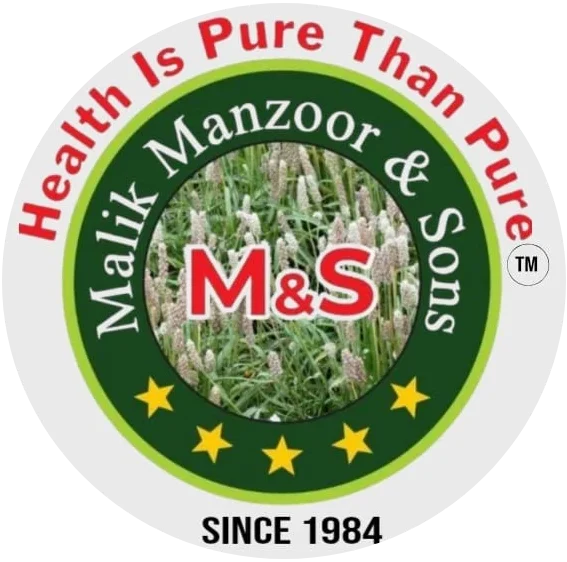Psyllium Husk in Pakistan: Benefits, Production, Brands, and Where to Buy

Growing up surrounded by the golden fields of Plantago ovata in Pakistan, I’ve witnessed firsthand how psyllium husk in Pakistan has evolved from a traditional household remedy into a globally recognized superfood. Every morning in countless Pakistani homes, people mix a spoonful of isabgol into water or milk – a ritual that’s been passed down through generations for digestive wellness and overall health.
What many people don’t realize is that Pakistan isn’t just a consumer of this remarkable fiber – we’re one of the world’s leading producers. The regions of Sindh, Punjab, and parts of Balochistan produce some of the highest-quality ispaghula husk Pakistan has to offer, supplying markets across the Middle East, Europe, Africa, and beyond. Our unique climate, soil composition, and generations of cultivation expertise create isabgol that meets the strictest international quality standards.
As someone who’s dedicated my life to growing and processing psyllium husk in Pakistan through Malik Psyllium, I’ve seen how this natural fiber transforms lives – from relieving chronic constipation to helping manage cholesterol and supporting weight loss efforts. In this comprehensive guide, I’ll share everything you need to know about psyllium husk in Pakistan, its benefits, how it’s produced, where to buy it, what to look for in quality brands, and how to use it effectively. Let’s explore why Pakistani isabgol is treasured worldwide.
What Is Psyllium Husk (Ispaghula/ Isabgol)?
Before diving into the specifics of psyllium husk in Pakistan, let me explain exactly what this fiber is and why it’s so valued in Pakistani households and internationally.
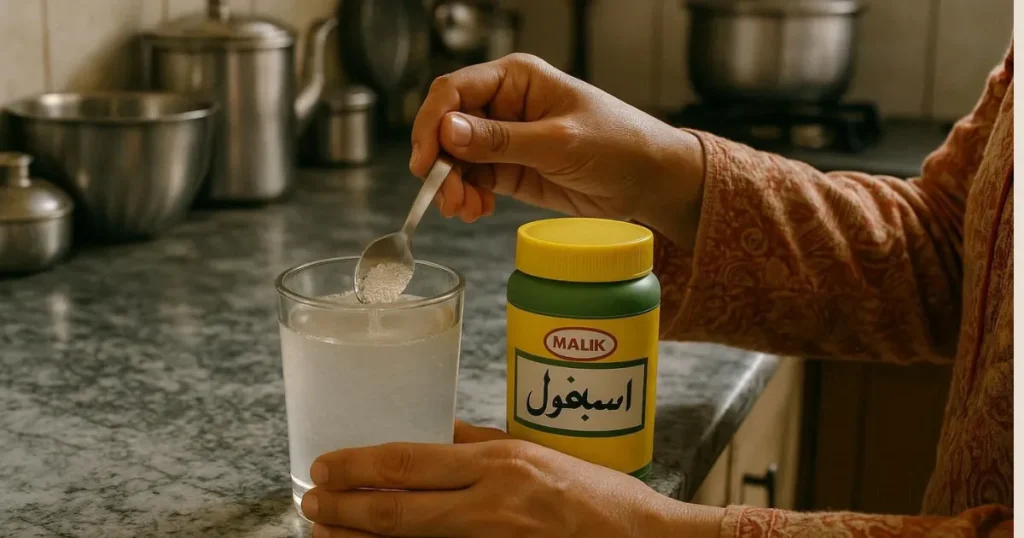
Understanding the Fiber
Psyllium husk is the outer layer of seeds from the Plantago ovata plant, a crop that thrives in Pakistan’s semi-arid climate. In Urdu, we call it “isabgol” (اسپغول), while pharmaceutical and international markets use terms like “ispaghula husk” or “psyllium husk.” These are all the same product – just different names reflecting regional and commercial usage.
What makes this husk so remarkable is its composition. It’s approximately 70-80% soluble fiber, which means when you mix it with water, it absorbs liquid and forms a gel-like consistency. This unique property is what gives isabgol its powerful health benefits. The fiber isn’t digested in the small intestine; instead, it travels to your colon, where it supports digestive health, feeds beneficial bacteria, and promotes regular bowel movements.
Traditional Use in Pakistan
In Pakistani homes, isabgol has been a trusted remedy for generations. My grandmother kept a container of isabgol in her kitchen, using it for various family health concerns. Constipation? Mix isabgol with warm milk before bed. Summer heat causing digestive issues? Isabgol with cold water provides cooling relief. Weight management? Take it before meals to reduce appetite naturally.
This traditional knowledge has been validated by modern science. What our elders knew through experience, researchers now confirm through clinical studies. The soluble fiber in ispaghula husk Pakistan produces creates bulk in the intestines, softening stool, reducing cholesterol absorption, and slowing glucose uptake – all mechanisms that support multiple aspects of health.
Why It’s Called Different Names
The terminology can be confusing, so let me clarify. “Isabgol” is the colloquial Urdu/Hindi name used across Pakistan, India, and neighboring countries. “Ispaghula husk” is the pharmaceutical term you’ll see on medical products and export labels. “Psyllium husk” is the anglicized name used in Western markets and scientific literature. All three refer to the same fiber from Plantago ovata – the name depends on who’s selling it and where.
When I export from Pakistan to different countries, I use “ispaghula husk Pakistan” for Middle Eastern markets, “psyllium husk” for Europe and America, and “isabgol” for local Pakistani distribution. The product inside every package is identical – pure, high-quality fiber from Pakistani farms.
Psyllium Husk Production in Pakistan
Understanding how psyllium husk in Pakistan is produced helps you appreciate why our product is so highly valued globally. Let me take you through the entire process, from seed to shelf.

Where It’s Grown
Pakistan cultivates Plantago ovata primarily in three regions, Sindh, Punjab, and parts of Balochistan. Each region offers slightly different growing conditions, but all produce excellent quality fiber.
In Sindh, particularly around Sanghar, Khairpur, and Hyderabad districts, the hot, dry climate and sandy loam soil create ideal conditions for isabgol cultivation. This is where my own farms are located, and I can tell you that the soil mineral composition here produces husk with exceptional swelling capacity.
Punjab’s southern districts, including Bahawalpur and Rahim Yar Khan, also grow significant quantities. The slightly cooler winters here allow for extended growing seasons, though the fiber characteristics differ marginally from Sindh production.
Balochistan contributes smaller quantities but increasingly important production, especially as demand grows. The arid conditions suit Plantago ovata perfectly, though water management is more challenging.
The Growing Cycle
Cultivating psyllium husk in Pakistan requires specific timing and careful management. We plant isabgol seeds in October or November, after the monsoon season ends and temperatures begin to cool. The plant needs cool nights and warm days during its growth period – exactly what Pakistan’s winter provides.
The crop matures over 120-130 days. During this time, we monitor soil moisture carefully. Too much water and the plants develop disease; too little and seed production suffers. It’s a delicate balance that requires experience to manage properly.
By February or March, the plants flower and begin producing seed pods. This is a critical period. I walk my fields daily during this time, checking for pests and ensuring optimal conditions. The timing of harvest affects the quality of the husk tremendously – harvest too early and the seeds haven’t fully developed their mucilage coating; wait too long and you lose seeds to natural dispersal.
Harvesting and Processing
When the seed pods turn brown and dry, we harvest the entire plant. Traditional methods involve cutting by hand, but larger operations use mechanical harvesters. The harvested plants are dried in the sun for several days – Pakistan’s dry winter climate is perfect for this.
Once dried, we thresh the plants to separate seeds from stalks. This creates a mixture of seeds, husk fragments, and plant debris. The next step – milling – is where expertise really matters.
In our processing facility, we use specialized machinery to gently crack the seeds and separate the delicate husk from the heavier seed kernel. This process requires precise calibration. Too much force and you pulverize the husk into useless dust; too little and the husk remains attached to the seeds.
After separation, we sieve the material multiple times to remove any remaining seed particles and plant matter. The final product should be 95-99% pure husk – pale cream in color, light and fluffy in texture, and free of contaminants.
Quality Control in Pakistani Production
At Malik Psyllium, we test every batch for purity, swelling index, moisture content, and microbial safety. The swelling index – how much the fiber expands in water – is particularly important. Pakistani ispaghula husk typically achieves swelling indices of 8-12, among the highest in the world.
We also test for heavy metals, pesticide residues, and aflatoxins. Export-quality psyllium husk in Pakistan must meet international standards set by the FDA (United States), European Pharmacopoeia, and other regulatory bodies. Our certifications include ISO, and organic certifications for specific product lines.
Pakistan’s Global Position
Pakistan ranks as one of the largest producers of psyllium husk globally. Together, Pakistan and India supply approximately 80% of the world’s isabgol. However, Pakistani production has unique advantages, our fiber often has higher purity levels due to less humid conditions during processing, and our strategic location provides efficient access to Middle Eastern and African markets.
The psyllium industry in Pakistan provides livelihoods for thousands of farming families and contributes significantly to agricultural exports. When you buy psyllium husk in Pakistan, you’re supporting an entire ecosystem of farmers, processors, and exporters who’ve refined this craft over generations.
Health Benefits of Psyllium Husk (Isabgol).
After decades of working with isabgol and hearing feedback from thousands of users across Pakistan and internationally, I can confidently speak to the remarkable health benefits this fiber provides. Let me share what both traditional wisdom and modern science confirm.

Digestive Health and Constipation Relief.
This is the most well-known benefit of psyllium husk in Pakistan. The soluble fiber absorbs water in your intestines – up to 10-15 times its weight – creating soft, bulky stools that pass easily. Unlike harsh chemical laxatives that irritate your digestive system and can cause dependency, isabgol works gently with your body’s natural processes.
I’ve had countless customers tell me about their struggles with chronic constipation – some suffering for years, trying various medications without lasting relief. Within 3-5 days of starting isabgol with adequate water intake, most experience significant improvement. The key is consistency and proper hydration.
What’s equally impressive is how ispaghula husk Pakistan produces can help with diarrhea too. The fiber absorbs excess water in loose stools, adding form and reducing frequency. This dual action – softening hard stools and firming loose ones – makes it uniquely versatile for digestive health.
Heart Health and Cholesterol Management.
Clinical studies consistently show that regular consumption of psyllium husk can lower LDL (bad cholesterol) by 5-10%. The mechanism is well-documented, soluble fiber binds to bile acids in your intestines, forcing your liver to use cholesterol from your bloodstream to produce more bile. This effectively removes cholesterol from circulation.
In Pakistan, where heart disease rates are rising due to changing diets and lifestyles, isabgol offers a natural, affordable way to support cardiovascular health. I’ve seen laboratory reports from users whose cholesterol levels improved dramatically after three months of consistent psyllium husk use alongside dietary improvements.
The benefits extend to blood pressure as well. While the effect is modest, regular isabgol consumption can contribute to maintaining healthy blood pressure levels, particularly when combined with reduced salt intake and regular exercise.
Weight Management Support.
Many Pakistanis struggle with weight management, especially in urban areas where sedentary lifestyles are common. Psyllium husk in Pakistan has become popular as a weight loss aid, and for good reason.
When you take isabgol 20-30 minutes before meals with plenty of water, it expands in your stomach, creating genuine feelings of fullness. This isn’t magic – it’s simple physics. The expanded fiber takes up space, triggering satiety signals that help you eat smaller portions without feeling deprived.
I always emphasize that isabgol isn’t a standalone weight-loss solution. However, when combined with balanced eating and regular activity, it’s remarkably effective. Many users report losing 5-8 kilograms over 3-4 months, attributing much of their success to how isabgol helps control portions and reduce between-meal snacking.
Blood Sugar Regulation for Diabetics.
Diabetes is a major health concern in Pakistan, affecting millions. Ispaghula husk Pakistan produces offers genuine benefits for blood sugar management. The gel-forming fiber slows the digestion and absorption of carbohydrates, preventing the sharp glucose spikes that occur after meals.
Multiple studies have documented improvements in fasting blood sugar and HbA1c levels with regular psyllium use. For Pakistani diabetics managing their condition through diet and medication, isabgol provides an additional tool that’s natural, affordable, and accessible.
I always advise diabetics to consult their doctor before starting, because as blood sugar improves, medication dosages may need adjustment. This isn’t a drawback – it’s evidence of how effective isabgol can be.
Detoxification and Colon Health.
In traditional Pakistani medicine, isabgol is valued as a detoxifying agent. As it moves through your digestive tract, the fiber collects toxins, undigested food particles, and waste materials, carrying them out of your body naturally.
Modern research supports this traditional use. The fiber promotes a healthy gut microbiome by serving as a prebiotic – food for beneficial bacteria. A balanced microbiome affects everything from immunity to mental health, making this benefit more significant than many realize.
Regular use of psyllium husk in Pakistan can support colon health, potentially reducing the risk of digestive disorders and promoting overall intestinal wellness.
Important Tip: Always drink a full glass of water – at least 250-300ml – immediately after taking isabgol. The fiber needs liquid to work properly. Without adequate water, it can cause dehydration, discomfort, or even blockages. This isn’t optional; it’s essential for both safety and effectiveness.
How to Use Psyllium Husk (Isabgol).
Understanding the benefits of psyllium husk in Pakistan is one thing; knowing how to use it effectively is another. Let me share the methods that work best based on both traditional Pakistani practices and modern recommendations.
Traditional Pakistani Methods.
For Constipation Relief:
Mix 1-2 teaspoons of isabgol with lukewarm water or milk before bedtime. Drink immediately – it thickens quickly – then follow with another glass of water. Most people experience a comfortable bowel movement the next morning. This is the most common use of psyllium husk in Pakistan households.
For Weight Management:
Take 1 teaspoon mixed with water and fresh lemon juice 20-30 minutes before lunch and dinner. The lemon adds flavor and vitamin C while the timing ensures the fiber expands in your stomach before you eat, promoting natural portion control.
For Heart Health:
Mix 1 teaspoon into a glass of milk, lassi, or fresh fruit juice once or twice daily. Taking it with meals may enhance its cholesterol-lowering effects, though it can be taken at any time as long as you maintain proper hydration.
For Cooling Effect (Summer):
In Pakistan’s hot summers, mix isabgol with cold water, a pinch of sugar, and a squeeze of lemon. Drink this cooling beverage that also supports digestion. This traditional summer remedy is both refreshing and beneficial.
Modern Applications.
In Smoothies:
Add 1 teaspoon to your morning smoothie. Blend briefly to incorporate – over-blending makes it too thick. This is perfect for people who dislike the texture of isabgol in plain water.
In Yogurt:
Stir isabgol into fresh yogurt or raita with spices. The combination of fiber and probiotics is excellent for digestive health.
In Cooking:
Some people add isabgol to roti or chapati dough for extra fiber. Use about 1 teaspoon per cup of flour. It can also be stirred into soups or dal just before serving.
Dosage Guidelines.
| Purpose | Recommended Amount | Best Timing | Frequency |
| Constipation | 1-2 teaspoons | Before bed | Once daily |
| Weight Loss | 1 teaspoon | 30 min before meals | 2-3 times daily |
| Cholesterol | 1-2 teaspoons | With meals | Once or twice daily |
| Blood Sugar | 1 teaspoon | Before main meals | Twice daily |
| General Fiber | 1 teaspoon | Any time | Once daily |
Beginner’s Approach:
Start with just 1 teaspoon once daily for the first week. Let your digestive system adjust gradually. Then increase to your target dosage. This prevents the bloating and discomfort that can occur when increasing fiber intake too quickly.
Maximum Safe Dose:
Don’t exceed 3 tablespoons (approximately 30 grams) per day without medical supervision. More isn’t always better with fiber.
Psyllium Husk Price in Pakistan.
Understanding the price range and where to buy psyllium husk in Pakistan helps you make informed purchasing decisions. Let me break down the current market situation.
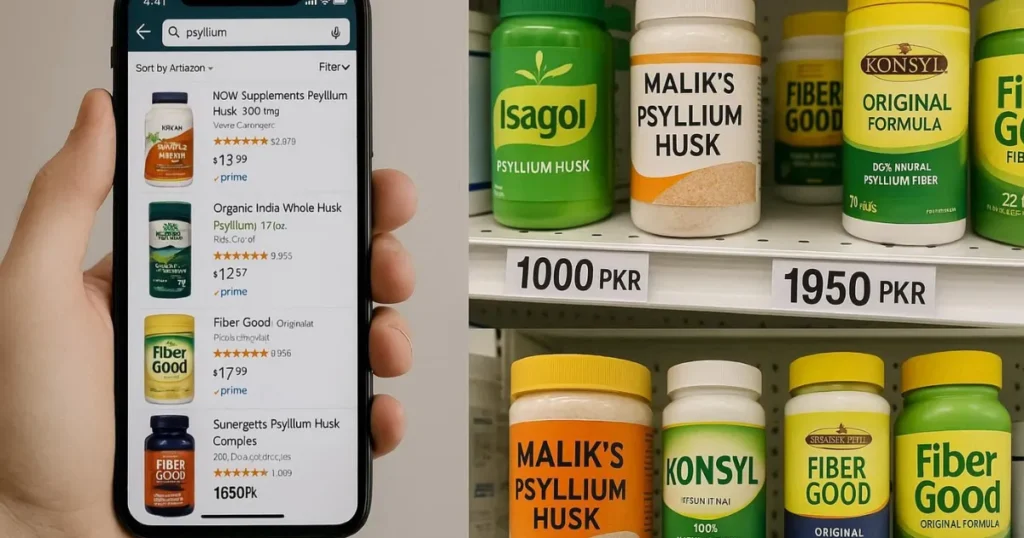
Retail Price Range.
As of 2025, psyllium husk in Pakistan typically costs:
Small quantities (100-200g):
- Basic brands: PKR 250-500
- Premium/organic brands: PKR 600-800.
- Imported brands: PKR 1,200-1,500.
Medium quantities (500g-1kg):
- Basic brands: PKR 2,500-3,500.
- Premium brands: PKR 4,000-5,000.
- Organic certified: PKR 5,500-7,000.
Bulk quantities (5kg+):
- Wholesale price: PKR 3,200-3,500 per kg.
- Export quality: PKR 4,000-5,500 per kg.
Prices vary based on purity, processing quality, certifications, and packaging. Organic and export-grade ispaghula husk Pakistan produces commands premium prices due to stricter quality control and certification costs.
Where to Buy.
Online Platforms:
- Daraz.pk (widest selection, competitive prices).
- HumMart.com (reliable for health products).
- Naheed.pk (trusted Pakistani brand).
- Malik Psyllium official website (direct from producer).
Physical Stores:
- Pharmacies (nationwide).
- Hyperstar, Imtiaz and Carrefour.
- Local medical stores and Hakeem shops.
- Organic food stores in major cities.
Wholesale Sources:
- Karachi’s medicine markets (Jodia Bazaar, Bolton Market).
- Lahore’s Akbari Mandi and Shah Alam Market.
- Hyderabad’s wholesale grain markets.
- Hasilpur, Punjab, Pakistan Direct from manufacturers and exporters.
What Affects Price.
Several factors influence psyllium husk prices in Pakistan:
Purity level: 95% pure isabgol costs less than 99% pure pharmaceutical grade
Processing method: Mechanically processed is cheaper than hand-selected premium grades
Certifications: ISO, organic, and export certifications add to costs
Form: Whole husk is typically cheaper than finely ground powder
Packaging: Basic bags cost less than premium jars with proper sealing
Brand reputation: Established brands charge more for their quality assurance.
Getting Good Value.
Don’t just buy the cheapest option. Low prices often mean lower purity, older stock, or questionable processing standards. For daily health use, investing in quality isabgol makes sense – the difference might be PKR 200-300, but the effectiveness gap can be significant.
At Malik Psyllium, we price our products to reflect our quality standards and certifications while remaining accessible to Pakistani consumers. Everyone deserves access to pure, effective isabgol.
Best Psyllium Husk Brands in Pakistan.
Choosing the right brand of psyllium husk in Pakistan matters for both quality and effectiveness. Let me share my insights on the most trusted options available.
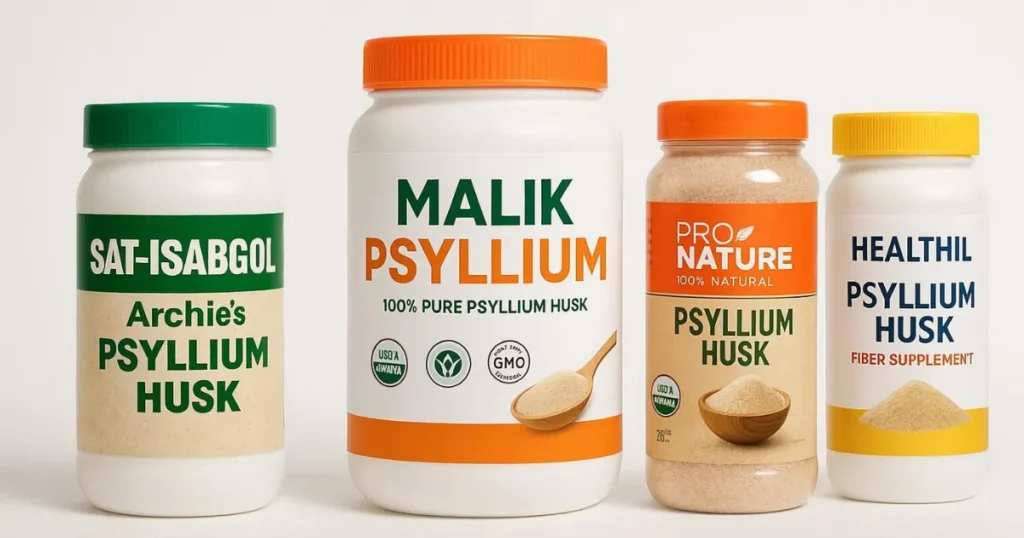
Top Pakistani Brands.
1. Malik Psyllium
This is my own brand, so I’m obviously biased, but let me share what makes us different. Certified with complete control over cultivation, processing, and packaging. Our isabgol comes directly from our farms in Sindh, ensuring traceability and quality. We export to over 15 countries, which means we maintain international standards for all our products. Premium Product at best prices in Pakistan and worldwide.
What sets Malik Psyllium apart is our purity testing – every batch is laboratory verified for purity, swelling index, and safety. We offer both conventional and organic options, whole husk and finely ground powder. Our packaging uses moisture-barrier materials to maintain freshness.
2. Hamdard Isabgol
A household name across Pakistan, Hamdard has been producing isabgol for decades. Their product follows traditional Unani formulations and is widely trusted. It’s affordable, readily available in almost every pharmacy, and maintains consistent quality. While not export-grade, it’s perfectly suitable for regular household use.
3. Qarshi Isabgol
Another established Pakistani brand specializing in herbal and natural products. Qarshi isabgol is known for good purity levels and reasonable pricing. They’re particularly popular in Punjab and have strong distribution networks.
How to Choose the Right Brand.
Look for these quality indicators when selecting psyllium husk in Pakistan:
- Clear labeling: Manufacturing date, expiry date, and batch number should be visible
- Purity percentage: Should state 95% minimum, ideally 98-99%
- Certifications: ISO, or organic certifications indicate serious quality control
- Packaging: Proper moisture-barrier packaging, not just simple plastic bags
- Color: Fresh isabgol should be pale cream to light tan, not dark brown
- Smell: Should have minimal odor, not musty or moldy
- Price: Suspiciously cheap often means compromised quality.
Expert Recommendation:
Start with a smaller quantity from any reputable brand. Test it – check how well it swells in water (should expand 8-10 times), observe the color and texture, and most importantly, see how your body responds. Once you find a brand that works well for you, buy in larger quantities to save money.
Storage and Shelf Life Tips.
Proper storage significantly affects the quality and effectiveness of your psyllium husk in Pakistan. Here’s what I’ve learned works best in Pakistani conditions.
Basic Storage Guidelines.
Container selection:
Transfer isabgol to an airtight glass jar or stainless steel container after opening. The original packaging often isn’t sufficient once opened, especially in Pakistan’s humid climate.
Location:
Store in a cool, dry cupboard away from the kitchen stove, sink, or any heat source. Direct sunlight degrades the fiber over time.
Humidity control:
This is critical in Pakistan, especially during the monsoon season. Never use wet spoons or hands in your isabgol container. Even slight moisture can cause clumping and mold growth.
Climate-Specific Advice.
In Karachi (high humidity):
Consider adding food-grade silica gel packets to your storage container. During monsoon, some people even store isabgol in the refrigerator, though this isn’t necessary if you have a dry storage space and a proper container.
In Lahore and Punjab (variable humidity):
Standard airtight storage in a cool cupboard works well most of the year. Be extra vigilant during the July-August monsoon period.
In Sindh interior and Balochistan (dry climate):
Standard storage works perfectly. The main concern here is heat, so keep isabgol away from sun exposure.
Shelf Life Expectations.
Unopened packages of ispaghula husk Pakistan produces typically last 2-3 years from the manufacturing date when stored properly. Once opened:
- Whole husk: 10-12 months with proper storage.
- Powdered form: 6-8 months (larger surface area means faster degradation).
- Capsules: Usually good until the printed expiry date if the bottle stays sealed.
Signs Your Isabgol Has Gone Bad.
Musty or moldy smell Dark coloration or dark spots Clumping or sticky texture Doesn’t swell properly in water (test: should expand 8-10 times within 3 minutes) Past expiry date by more than 2-3 months.
When in doubt, discard and buy fresh. The cost of replacing expired isabgol is minimal compared to the potential digestive discomfort from using a compromised product.
What is psyllium husk called in Urdu?
In Urdu, psyllium husk is called “isabgol” (اسپغول). This is the common name used throughout Pakistan in homes, pharmacies, and traditional medicine shops. Some people also use “ispaghol” or “ispaghula,” which are slight variations of the same word. All these terms refer to the same fiber from Plantago ovata seeds that’s used for digestive health and overall wellness.
Where can I buy psyllium husk in Pakistan?
You can buy psyllium husk in Pakistan from multiple sources. Online, it’s available on Daraz.pk, HumMart.com, and Naheed.pk, as well as directly from brand websites like Malik Psyllium. Offline, you’ll find it in pharmacies, as well as Grocery Stores, and local shops. For bulk quantities, visit wholesale markets in Karachi (Jodia Bazaar), Lahore (Shah Alam Market), or directly contact manufacturers and exporters.
Is psyllium husk safe to take daily?
Yes, psyllium husk is safe to take daily for most people. In Pakistan, many families have used isabgol daily for generations without issues. The recommended dose is 1-2 teaspoons daily with plenty of water. Start with 1 teaspoon for the first week to let your body adjust, then increase if needed. The key is drinking at least 250ml of water with each dose and staying well-hydrated throughout the day. Consult a doctor if you’re on medications, as isabgol can affect drug absorption.
Which is the best psyllium husk brand in Pakistan?
The best brands of psyllium husk in Pakistan include Malik Psyllium (certified, export-quality, afforbale price), Hamdard Isabgol (traditional, widely trusted), Qarshi Isabgol (good quality, affordable). The “best” depends on your needs – for daily household use, Hamdard or Qarshi work well; for premium quality, choose Malik Psyllium or Sat-Isabgol. Always check for proper labeling, certifications, and recent manufacturing dates.
What is the difference between ispaghula husk and psyllium husk?
There is no difference – ispaghula husk and psyllium husk are the same product. Both come from Plantago ovata plant seeds. “Ispaghula” or “isabgol” is the traditional name used in Pakistan, India, and Middle Eastern countries. “Psyllium husk” is the anglicized term used in Western markets and scientific literature. The composition, health benefits, and uses are identical. Whether the package says ispaghula husk Pakistan or psyllium husk, you’re getting the same natural fiber.
Can psyllium husk help with weight loss?
Yes, psyllium husk can support weight loss when combined with a healthy diet and exercise. It’s not a magic solution but a helpful tool. Take 1 teaspoon with water 20-30 minutes before meals – the fiber expands in your stomach, creating fullness that helps you eat smaller portions naturally. Many users in Pakistan report successful weight loss using isabgol this way, typically losing 5-8 kg over 3-4 months. The key is consistency, adequate water intake, and combining it with overall healthy lifestyle choices.
How much does psyllium husk cost in Pakistan?
Psyllium husk in Pakistan typically costs PKR 400-1,000 for 100-200g, depending on brand and quality. Premium and organic brands cost more (up to PKR 1,500), while basic brands are cheaper (PKR 300-400). For larger quantities, 500g-1kg packages range from PKR 4,000-6,000 depending on quality grade. Bulk buyers can get wholesale prices of PKR 3,000-3,500 per kg. Prices vary by purity level, certifications, processing quality, and brand reputation. Online platforms often offer competitive prices compared to physical stores.
Is Pakistani psyllium husk of good quality?
Yes, psyllium husk produced in Pakistan is excellent quality and internationally recognized. Pakistan is one of the world’s second-largest producers, with our Sindh and Punjab regions producing some of the purest isabgol available globally. Pakistani ispaghula husk often achieves 95-99% purity with high swelling indices (8-12). We export to over 50 countries, meeting strict international standards, including FDA and European Pharmacopoeia requirements. The climate and soil in Pakistan are ideal for Plantago ovata cultivation, producing fiber with exceptional mucilage content and effectiveness.
Conclusion – Psyllium Husk: Pakistan’s Gift to Global Health
After exploring everything about psyllium husk in Pakistan – from how we grow it in Sindh’s fields to where you can buy it in Karachi’s markets – I hope you appreciate why this natural fiber is such a treasure. Pakistan doesn’t just consume isabgol; we’re custodians of one of the world’s most important sources of this healing fiber.
Whether you’re dealing with digestive issues, managing cholesterol, supporting weight loss, or want to add more natural fiber to your diet, ispaghula husk Pakistan produces offers a solution that’s effective, affordable, and deeply rooted in our traditional medicine practices. The fact that modern science continues to validate what Pakistani families have known for generations speaks to the genuine value of this simple seed husk.
When choosing psyllium husk in Pakistan, prioritize quality over price. Look for reputable brands with proper certifications, clear labeling, and fresh manufacturing dates. Whether you choose Malik Psyllium, Hamdard, or any other trusted brand, ensure you’re getting pure, properly processed isabgol that will deliver the health benefits you seek.
Remember the golden rule, always take your isabgol with plenty of water. This isn’t just advice – it’s essential for both safety and effectiveness. Start with small amounts, increase gradually, and give your body time to adjust to the increased fiber.
As someone who’s dedicated my life to cultivating and sharing the finest psyllium husk in Pakistan, I’m proud to be part of this tradition. Every package of Malik Psyllium isabgol represents generations of agricultural expertise, modern quality standards, and a commitment to supporting health naturally.
Add a spoonful of Pakistani isabgol to your daily routine. Your digestive system, your heart, and your overall wellness will thank you. This is nature’s gift, perfected by Pakistan’s soil and sun, ready to support your health journey.
Malik Shabbir
Featured Blogs
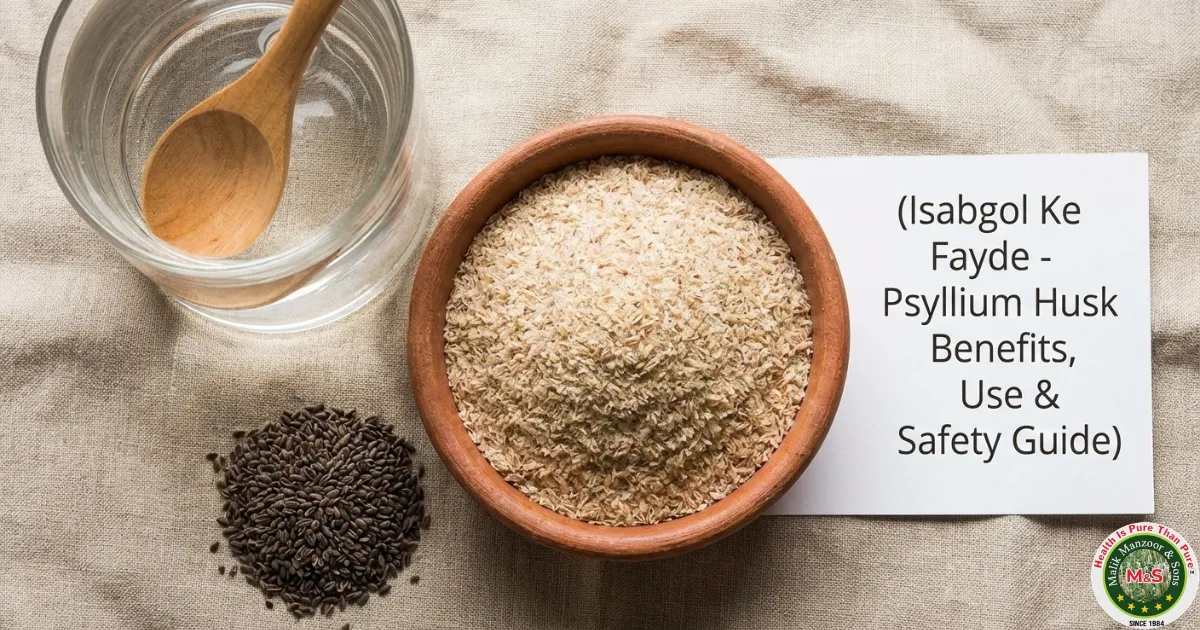
Isabgol Ke Fayde – Psyllium Husk Ke Poori Science-Based Rahnumayi – 2026
Isabgol ke fayde jaanna aaj ke daur mein zyada zaroori
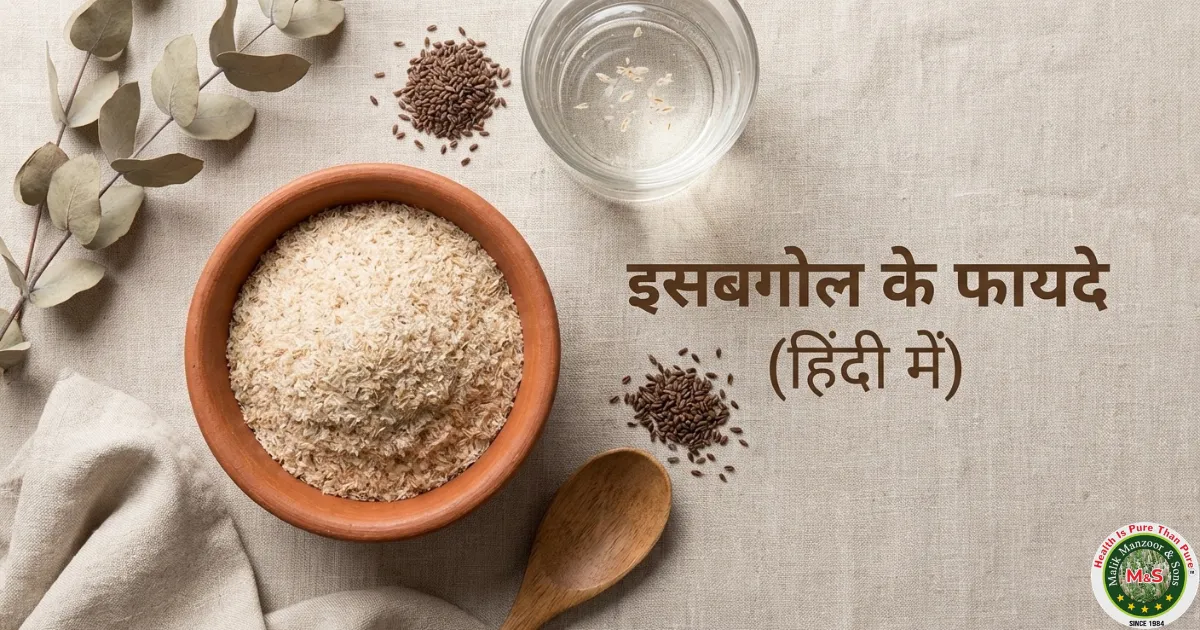
Isabgol Benefits in Hindi | Psyllium Husk Ke Fayde, Sahi Upyog Aur Savdhaniyan – 2026
Agar aap isabgol benefits in hindi mein samajhna chahte hain,
